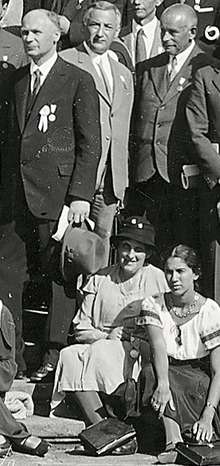Otto Blumenthal
Ludwig Otto Blumenthal (20 July 1876 – 12 November 1944) was a German mathematician and professor at RWTH Aachen University.
Ludwig Otto Blumenthal | |
|---|---|
 Left to right, standing: Michel Plancherel, Prof. Karl Goldziher (Budapest), Otto Blumenthal, sitting: Ms. Blumenthal, and an unknown woman, at the International Mathematical Congress, Zürich 1932 | |
| Born | 20 July 1876 |
| Died | 12 November 1944 (aged 68) Theresienstadt concentration camp |
| Alma mater | Göttingen University |
| Known for | Editor of Mathematische Annalen, 1906-1938 |
| Spouse(s) | Mali Ebstein |
| Children | Margrete (born 1911), Ernst (born 1914) |
| Scientific career | |
| Thesis | Über die Entwicklung einer willkürlichen Funktion nach den Nennern des Kettenbruches (1898) |
| Doctoral advisor | David Hilbert |
| Doctoral students | Karl Gehlen |
Biography
He was born in Frankfurt, Hesse-Nassau. A student of David Hilbert, Blumenthal was an editor of Mathematische Annalen. When the Civil Service Act of 1933 became law in 1933, after Hitler became Chancellor, Blumenthal was dismissed from his position at RWTH Aachen University.[1][2] He was married to Amalie Ebstein, also known as 'Mali'[3] and daughter of prof. dr. Wilhelm Ebstein.
Blumenthal, who was of Jewish background, emigrated from the Nazis to the Netherlands, lived in Utrecht and was deported via Westerbork to the concentration camp, Theresienstadt in Bohemia (now Czech Republic), where he died.
In 1913, Blumenthal made a fundamental, though often overlooked, contribution to aerodynamics by building on Joukowsky's work to extract the complex transformation that carries the latter's name,[4] making it an example of Stigler's Law.
Selected publications
- Otto Blumenthal (1903). "Zum Eliminationsproblem bei analytischen Funktionen mehrerer Veränderlicher" (PDF). Math. Ann. 57: 356–368. doi:10.1007/bf01444291.
- Otto Blumenthal (1904). "Über Thetafunktionen und Modulfunktionen mehrerer Veränderlicher" (PDF). Jahresbericht der Deutschen Mathematiker-Vereinigung. 13: 126–138.
- Otto Blumenthal (1905). "Über die Zerlegung unendlicher Vektorfelder" (PDF). Math. Ann. 61: 235–250. doi:10.1007/bf01457564.
- Otto Blumenthal (1907). "Über ganze transzendente Funktionen" (PDF). Jahresbericht der Deutschen Mathematiker-Vereinigung. 16: 97–109.
- Otto Blumenthal (1916). "Einige Minimums-Sätze über trigonometrische und rationale Polynome" (PDF). Math. Ann. 77: 390–403. doi:10.1007/bf01475868.
- Otto Blumenthal (1931). "Über rationale Polynome mit einer Minimumseigenschaft" (PDF). Journal für die reine und angewandte Mathematik. 165: 237–246.
- Otto Blumenthal (1935). "Lebensgeschichte". Analysis — Grundlagen der Mathematik — Physik — Verschiedenes — Nebst einer Lebensgeschichte. David Hilbert — Gesammelte Abhandlungen. 3. Berlin: Julius Springer. pp. 388–429. Archived from the original on 2016-03-06. Retrieved 2015-09-28.
- Otto Blumenthal (1935). "Zu den Entwicklungen nach Eigenfunktionen linearer symmetrischer Integralgleichungen" (PDF). Mathematische Annalen. 110: 726–733. doi:10.1007/bf01448053.
References
- Voices from Exile: Essays in Memory of Hamish Ritchie. BRILL. 2015-06-05. ISBN 978-90-04-29639-8.
- Hoffmann, Dieter; Walker, Mark (2012). The German Physical Society in the Third Reich: Physicists Between Autonomy and Accommodation. Cambridge University Press. ISBN 978-1-107-00684-3.
- Felsch, Volkmar (2011). Otto Blumenthals Tagebücher. Hartung-Gorre Verlag. ISBN 978-3-86628-384-8.
- Heinrich Behnke (1958). "Otto Blumenthal zum Gedächtnis". Mathematische Annalen (in German). 136 (5): 387–392. doi:10.1007/bf01347791.
External links
![]()
- O'Connor, John J.; Robertson, Edmund F., "Otto Blumenthal", MacTutor History of Mathematics archive, University of St Andrews.